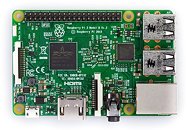- Joined
- Aug 20, 2007
- Messages
- 22,237 (3.44/day)
- Location
- Olympia, WA
| System Name | Pioneer |
|---|---|
| Processor | Ryzen 9 9950X |
| Motherboard | MSI MAG X670E Tomahawk Wifi |
| Cooling | Noctua NH-D15 + A whole lotta Sunon, Phanteks and Corsair Maglev blower fans... |
| Memory | 128GB (4x 32GB) G.Skill Flare X5 @ DDR5-4200(Running 1:1:1 w/FCLK) |
| Video Card(s) | XFX RX 7900 XTX Speedster Merc 310 |
| Storage | Intel 5800X Optane 800GB boot, +2x Crucial P5 Plus 2TB PCIe 4.0 NVMe SSDs, 1x 2TB Seagate Exos 3.5" |
| Display(s) | 55" LG 55" B9 OLED 4K Display |
| Case | Thermaltake Core X31 |
| Audio Device(s) | TOSLINK->Schiit Modi MB->Asgard 2 DAC Amp->AKG Pro K712 Headphones or HDMI->B9 OLED |
| Power Supply | FSP Hydro Ti Pro 850W |
| Mouse | Logitech G305 Lightspeed Wireless |
| Keyboard | WASD Code v3 with Cherry Green keyswitches + PBT DS keycaps |
| Software | Gentoo Linux x64, other office machines run Windows 11 Enterprise |
If you have your Raspberry Pi setup and have never changed the default password on the standard "pi" user, it's probably time to do so. A new malware has come out that exploits the simple fact several users apparently have never changed this password. Once it installs itself, it exploits the recent rise in value on cryptocurrency (Bitcoin recently topped $3000 per BTC) to mine cryptocoins for the authors benefit. This not only uses almost 100% of your poor Raspberry Pi's limited CPU, but also makes it part of a "mining botnet" that nets the controller money, adding insult to injury. The malware also makes an anonymous proxy on your box, which needless to say is probably not a good thing.

You might think you are safe behind a firewall, but with the rise of IPv6 on many ISPs and the fact that many older firewalls are not IPv6 ready, you may be surprised to find your SSH port is in fact exposed on the internet whether you know it or not via a global IPv6 address, NAT isn't a guarantee anymore, folks. It is in fact best to actually have a strong, non-default password on your box, even if it is just a little ARM-core.
Unfortunately, as Cryptocurrency rises in value and becomes more legitimate, it brings with it both positive, tangible benefits for society, and sadly, criminal fringe elements. I'd argue that the dollar is still the most widely used currency for criminal transactions, but there's more to it than that for certain. Maybe that's a topic for a future editorial? I don't know.
For now, just remember to always be vigilant in system security, as malware is sure to explode more than ever now that people have realized that they can make a profit on your misery.
View at TechPowerUp Main Site

You might think you are safe behind a firewall, but with the rise of IPv6 on many ISPs and the fact that many older firewalls are not IPv6 ready, you may be surprised to find your SSH port is in fact exposed on the internet whether you know it or not via a global IPv6 address, NAT isn't a guarantee anymore, folks. It is in fact best to actually have a strong, non-default password on your box, even if it is just a little ARM-core.
Unfortunately, as Cryptocurrency rises in value and becomes more legitimate, it brings with it both positive, tangible benefits for society, and sadly, criminal fringe elements. I'd argue that the dollar is still the most widely used currency for criminal transactions, but there's more to it than that for certain. Maybe that's a topic for a future editorial? I don't know.
For now, just remember to always be vigilant in system security, as malware is sure to explode more than ever now that people have realized that they can make a profit on your misery.
View at TechPowerUp Main Site
Last edited:




 (thought the SOC was still a Broadcom2837)
(thought the SOC was still a Broadcom2837)